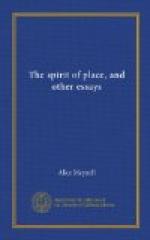Music seems to be principally answerable. For the lyrics of the lady are “words for music” by a great majority. There is hardly a single poem in the Elizabethan Song-books, properly so named, that has what would in our day be called a tone of sentiment. Music had not then the tone herself; she was ingenious, and so must the words be. She had the air of epigram, and an accurately definite limit. So, too, the lady of the lyrics, who might be called the lady of the stanzas, so strictly does she go by measure. When she is quarrelsome, it is but fuguishness; when she dances, she does it by a canon. She could not but be perverse, merrily sung to such grave notes.
So fixed was the law of this perversity that none in the song-books is allowed to be kind enough for a “melody,” except one lady only. She may thus derogate, for the exceedingly Elizabethan reason that she is “brown.” She is brown and kind, and a “sad flower,” but the song made for her would have been too insipid, apparently, without an antithesis. The fair one is warned that her disdain makes her even less lovely than the brown.
Fair as a lily, hard to please, easily angry, ungrateful for innumerable verses, uncertain with the regularity of the madrigal, and inconstant with the punctuality of a stanza, she has gone with the arts of that day; and neither verse nor music will ever make such another lady. She refused to observe the transiency of roses; she never really intended—much as she was urged—to be a shepherdess; she was never persuaded to mitigate her dress. In return, the world has let her disappear. She scorned the poets until they turned upon her in the epigram of many a final couplet; and of these the last has been long written. Her “No” was set to counterpoint in the part-song, and she frightened Love out of her sight in a ballet. Those occupations are gone, and the lovely Elizabethan has slipped away. She was something less than mortal.
But she who was more than mortal was mortal too. This was no lady of the unanimous lyrists, but a rare visitant unknown to these exquisite little talents. She was not set for singing, but poetry spoke of her; sometimes when she was sleeping, and then Fletcher said—
None can rock Heaven to sleep but her.
Or when she was singing, and Carew rhymed—
Ask me no more whither doth haste
The nightingale when May is past;
For in your sweet dividing throat
She winters, and keeps warm her
note.
Sometimes when the lady was dead, and Carew, again, wrote on her monument—
And here the precious dust is laid,
Whose purely-tempered clay was made
So fine that it the guest betrayed.
But there was besides another Lady of the lyrics; one who will never pass from the world, but has passed from song. In the sixteenth century and in the seventeenth century this lady was Death. Her inspiration never failed; not a poet but found it as fresh as the inspiration of life. Fancy was not quenched by the inevitable thought in those days, as it is in ours, and the phrase lost no dignity by the integrity of use.




